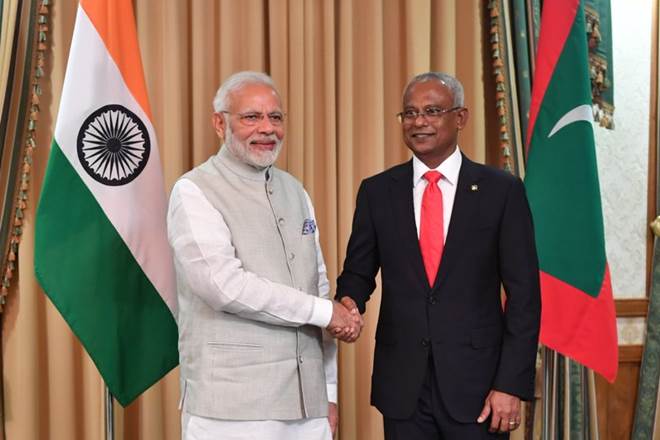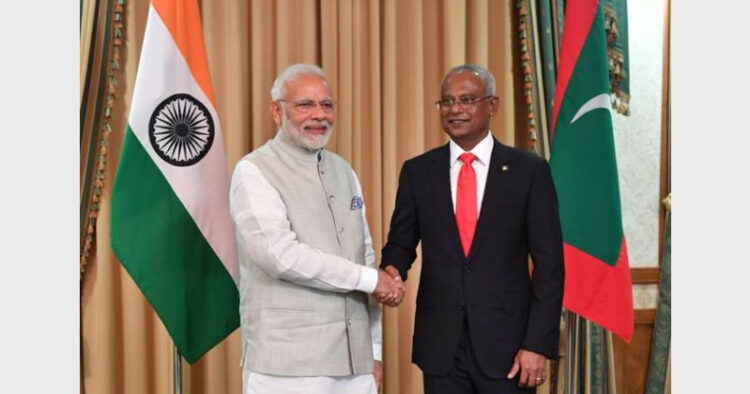
New Delhi: India and the Maldives bilateral relations have seen immense improvement in the last year or so.
In a major development in improvement with ties with strategically vital, the Maldives, India has achieved a ‘new landmark’ in blue waters and Regional Connectivity with the commencement of Direct Cargo Ferry Service between the two countries.
The ferry service, which was first announced by Prime Minister Narendra Modi in June 2019 during his visit to the Maldives immediately after swearing-in for the second term, was launched in an e-flag off ceremony jointly by India’s Minister of Shipping, Mansukh Mandaviya, and Minister of Transport and Civil Aviation of Maldives Ms Aishath Nahula on Monday.
“This is the first time that a direct cargo shipping line is connecting the two neighbouring countries,” a senior official said.
It may be mentioned that last month, India also had announced that it would fund the implementation of the Greater Male Connectivity Project (GMCP) to revitalise the Maldivian economy through a $400 million Line of Credit (LOC) and $100 million grant linking its capital Male with Gulhifalhu Port and Thilafushi industrial zone along with a regular cargo ferry service”.
“Happy to announce the start of regular cargo ferry service between India and Maldives to boost trade and commerce. We are also starting an air travel bubble with Maldives to sustain and promote the dynamic people-to-people ties between the two countries,” External Affairs Minister S. Jaishankar said in a tweet after virtual meeting with Maldives Foreign Minister Abdulla Shahid.
Currently, maximum imports to Male originate from Dubai, China, Singapore and Colombo, where Dubai, Singapore and Colombo are mostly transhipment ports. A direct and reliable service will provide an alternate and cost-effective way of transportation of goods from India to Maldives.
The ferry service will run twice a month. It will be operated by Shipping Corporation of India ship on a vessel with a capacity of 380 TEUs.
The ferry will herald direct connectivity for movement of cargo between India and Maldives and thereby give a boost to bilateral trade, sources said.
“Despite geographical proximity, India is currently only the 4th largest trade partner of Maldives. Maldives imports more from UAE, China and Singapore implying that bilateral trade with India is not commensurate with it’s potential,” the source explained.
It may be mentioned that Prime Minister Modi’s foreign policy has remained personality focus with himself trying to strike a personal rapport with leadership in countries like the Maldives, Indonesia and Saudi Arabia.
Last month in a tweet, PM Modi wrote: “Our special friendship (India-Maldives) is, and will always remain, as deep as the waters of the Indian Ocean”.
India’s bilateral trade has hovered around US$ 280 million annually for some years now and stood at US$ 286.85 million in 2019.
The direct ferry will reduce transportation cost, provide a timely, short and cost-effective means of transportation for goods from India to the Maldives and thereby help push up more trades between the two countries.
The ferry has cold storage facility, which will also allow more exports from the Maldives of tuna fish and other marine food items which are a speciality of Maldives, the source said.
Since the Maldives is a 100 per cent import-dependent country, improved connectivity between India and Maldives will help boost bilateral trade and help economic activity in the Maldives, already reeling under the disruption brought about by the Covid19.
Sources said trade body FICCI organised three virtual roadshows in Tuticorin, Kochi and Mumbai recently to publicise this service. The response from exporters has been positive.
During its maiden journey, the ferry will make a stop at Kulhudhuffushi port in North Maldives, before it reaches Male on September 29, 2020.
The Government of Maldives is making concerted efforts to revitalise the economy of Northern Maldives.
It is understood that to give financial incentives, the Maldives Majlis has approved a 50% reduction in custom duties for import items cleared at Kulhudhuffushi port.
India has also been assisting the Maldivian authorities in developing its Northern region.
The central government has been working to promote a number of initiatives and projects to increase regional connectivity in the Indian Ocean Region.














Comments